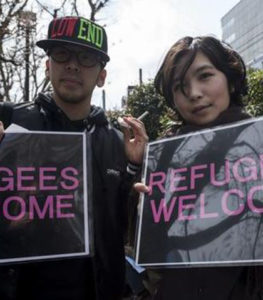Japan urged to take more refugees
The United Nations has asked Japan to review its tough approach to asylum seekers on humanitarian grounds.
The UN’s refugee agency UNHCR has urged Japan to resettle more asylum seekers to help solve the global displacement crisis after Japanese authorities granted refugee status to just three people in the first half of this year.
 The UN High Commissioner for Refugees Filippo Grandi told a news conference in Tokyo this week: “I have asked the government to consider whether it could be expanded”.
The UN High Commissioner for Refugees Filippo Grandi told a news conference in Tokyo this week: “I have asked the government to consider whether it could be expanded”.
Even though Japan is one of the most generous global donors to the UNHCR, its reluctance to accept asylum seekers ensures that less than one per cent of applicants make it through strict screening procedures.
And the process can take years, with some people detained in immigration facilities for long, even indefinite, periods.
Japan is one of the developed world’s least welcoming countries for asylum seekers. It accepted 28 in 2016, despite applications from a record 10,091 people.
Since 2008 it has afforded refuge to limited numbers of refugees through a so-called third-country resettlement scheme, resettling a total of 152 people – mostly ethnic Karen people from Myanmar living in Thai and Malaysian camps.
But in another development, Japan is planning to release asylum seekers facing long-term detention.
Japan is finalising new supervisory measures that will allow foreign nationals applying for refugee status and expected to be in detention for more than six months to be released and have a social life, according to immigration officials.
During the COVID-19 pandemic, asylum seekers in Japan have been among the hardest hit with the support available to them curtailed, NGOs claim.
The Japan Association for Refugees (JAR), based in Tokyo, was founded in 1999 to assist asylum seekers and lobby the government for a more generous refugee policy.
As well as assisting with applications, shelter, food and job searches, JAR officials visit detention centres for asylum seekers who are taken into custody by immigration authorities.
JAR says that about 60 per cent of the some 600 people each year who request assistance are from Africa.
The organisation says that unlike Asian refugees, who can find support from ethnic communities already in Japan, African asylum seekers prefer to rely on NGOs.
They fear that being exposed to compatriots may lead to reprisals from home governments against loved ones back home.
Around 15 to 20 refugees visited JAR’s office daily before the pandemic, but the outbreak forced it to change how it operates.
Since then, the NGO has opened its doors twice a week instead of four, implemented strict sanitation, reduced the number of staff at the office and introduced telework.
Calls and emails have become the norm, although many refugees can only use public Wi-Fi, made a more difficult task when public spaces were closed during Tokyo’s stay-at-home requests.
For those unable to get in touch, JAR has a room for them to speak online to staff members or interpreters working from home. Around 150 people visited the office from early April to early June.
JAR says it takes an average of three years for a successful applicant to be recognised as a refugee, although it has sometimes taken as long as ten years through multiple appeals.
Applicants who have legal status at the time of their asylum application can apply for work permits after eight months. But those on provisional release from detention are given no residency and have no work permit or national health insurance.
Those in detention centres, meanwhile, are stuck without knowing when they can get out as Japan has no limit on the length of detention.












